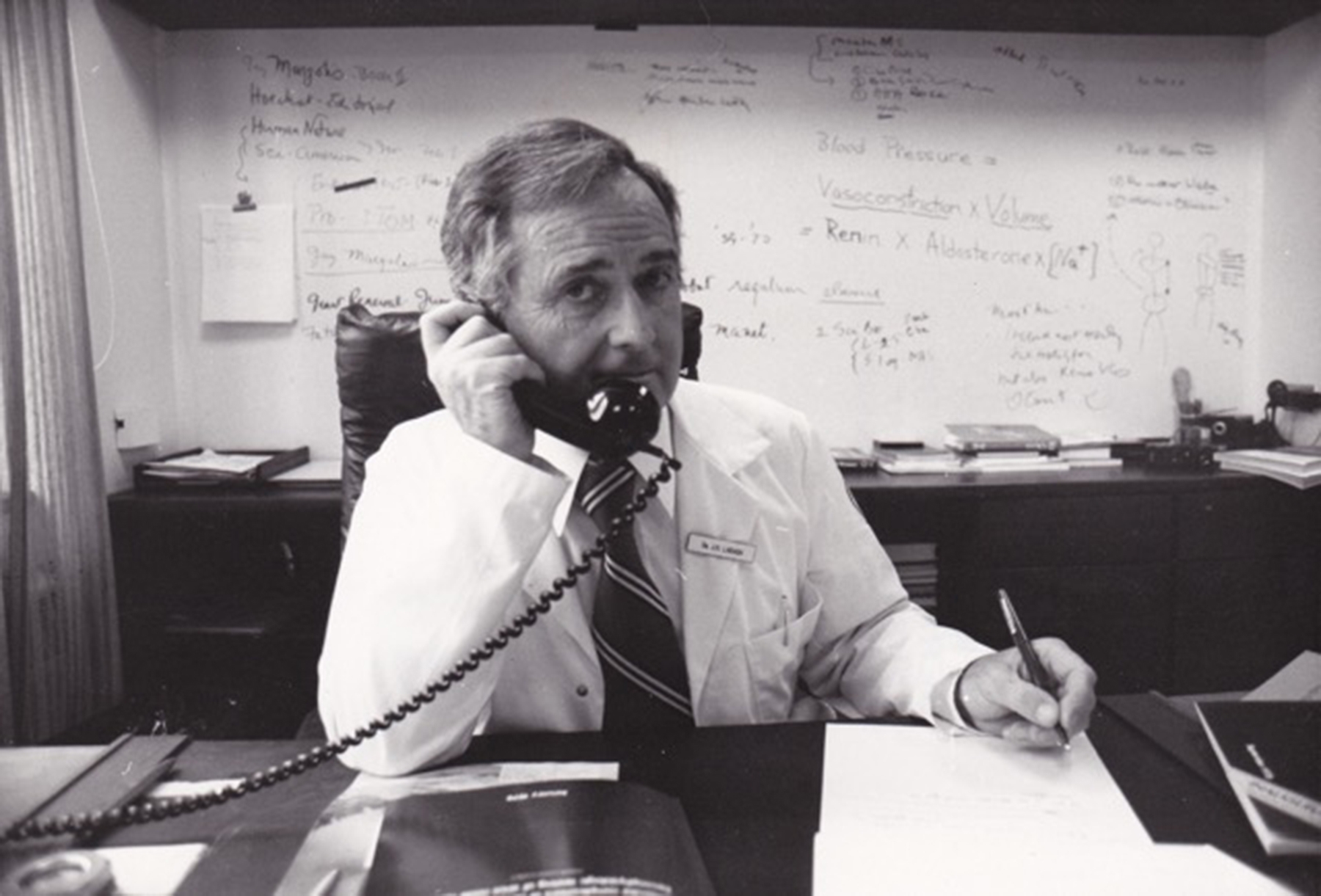Remembering hypertension expert Dr. John Laragh '48
Patients with high blood pressure have significantly longer life expectancies than they did decades ago — and in no small part, they have Dr. John Laragh '48 to thank for it. The internationally renowned clinician-scientist and longtime Weill Cornell Medicine faculty member, who died March 20, 2015 at age 90, did groundbreaking research into the causes and consequences of hypertension. His work led to the development of two new classes of drugs — ACEs (angiotensin converting enzyme inhibitors) and ARBs (angiotensin receptor blockers) — that have become therapeutic mainstays and helped revolutionize the treatment of heart disease, kidney ailments and diabetes.
Dr. Laragh founded The Hypertension Center at NewYork-Presbyterian/Weill Cornell Medical Center in the '70s, established the hospital's cardiovascular center, and served as chief of cardiology for nearly 20 years. Dedicated to investigating the underpinnings of hypertension, Dr. Laragh emphasized the significance of a precise, data-driven approach to managing patients with the condition. "He was a fascinating, brilliant, charming individual who contributed so much — maybe as much as any one person — to our knowledge of the treatment of high blood pressure," says Dr. Phyllis August, the Ralph A. Baer Professor of Medical Research and director of the Hypertension Center at Weill Cornell Medicine. "He was a pioneer, a maverick. He was creative; he was funny; he was a magnet for young people who wanted to learn about high blood pressure."Patients with high blood pressure have significantly longer life expectancies than they did decades ago — and in no small part, they have Dr. John Laragh '48 to thank for it. The internationally renowned clinician-scientist and longtime Weill Cornell Medicine faculty member, who died March 20, 2015 at age 90, did groundbreaking research into the causes and consequences of hypertension. His work led to the development of two new classes of drugs — ACEs (angiotensin converting enzyme inhibitors) and ARBs (angiotensin receptor blockers) — that have become therapeutic mainstays and helped revolutionize the treatment of heart disease, kidney ailments and diabetes.
Born and raised in Yonkers, where his grandfather served as mayor, Dr. Laragh lost both parents as a teenager. During World War II he volunteered for the Army, which sent him to medical school. He did his residency in internal medicine at Columbia, where he met his mentor, department chairman Dr. Robert Loeb, who inspired him to question dogma — a mindset that Dr. Laragh would pass on to his own students. "He trained so many people to think for themselves," says his widow, Dr. Jean Sealey-Laragh, a research professor emerita of physiology and biophysics in medicine at Weill Cornell Medicine, who was married to Dr. Laragh for 40 years. "They, in turn, quote him to their students, so it's an ever-widening circle."
Dr. Laragh was founding president of the American Society of Hypertension and founding editor-in-chief of the American Journal of Hypertension. Before joining Weill Cornell Medicine's faculty in 1975, he was chief of nephrology at Columbia. In January of that year, Time magazine featured his research in a cover story — and those discoveries, along with his many other contributions to the field, remain relevant today. Collaborating with his wife, Dr. Laragh demonstrated a strong interaction among the kidneys, salt and the hormones of the renin-angiotensin system, which regulates blood pressure and fluid balance. He concluded that there are two main causes of high blood pressure: excess salt in body fluids and excess plasma renin (a kidney-produced hormone) in the blood. A plasma renin-based treatment algorithm, known as the Laragh Method, enables clinicians to determine which of these two causes predominates and to select medications accordingly. "The product of his work is used every day by millions of physicians taking care of patients," says Dr. Jon Blumenfeld, the Maxwell Professor of Clinical Medicine and director of hypertension at the Rogosin Institute, a Weill Cornell Medicine-affiliated research and clinical center specializing in kidney disease.
In addition to Dr. Laragh's wife, survivors include two sons and two granddaughters. In 1996, the couple moved from New York City to Palm Beach County, Fla., where he pursued his longtime passion for golf. He continued to be a physician-scientist, publishing journal articles until about two years ago. "A physician should come to the bedside with compassion, but with scientific knowledge," he once said. "When he has both he will have the joy of a very special career."
— Susan Kreimer
This story first appeared in Weill Cornell Medicine, Vol. 14, No.3.


